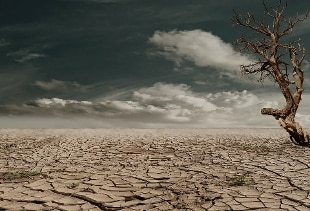- Climate: stressed bees don't fly anymore, production down 40% with peaks of -70%
- For a scientific view of the climate
- Climate. Scientists' appeal to Europe: "Change course to protect the health of citizens"
- Climate, Cop24 adopts the rules for the implementation of the Paris agreement. Without new ambitions
- Climate, carbon dioxide emissions also increase in 2018
Share
08 August 2019 Man-made global warming will increase drought and extreme rains throughout the world, affecting agricultural production and food safety. The consequences will be borne mainly by the poorest populations of Africa and Asia, with wars and migrations. But even the Mediterranean is at high risk of desertification and fires. According to the report "Climate change and territory" of the UN scientific committee on climate, the IPCC, released this morning.The IPCC in October 2018 published the famous climate report that warned that, if the world does not immediately reduce the emission of greenhouse gases, already in 2030 global warming could exceed the threshold of +1.5 degrees from levels pre-industrial. The report released today focuses on the relationship between climate change and the territory, studying the consequences of heating on agriculture and forests. It was prepared by 66 researchers from around the world, including the Italian Angela Morelli.
Even with global warming at 1.5 degrees from pre-industrial levels (the most ambitious goal of the 2015 Paris Climate Agreement), risks from water scarcity, fires, permafrost degradation are assessed as "high". and instability in food supply. But if climate change reaches or exceeds 2 degrees (the minimum goal in Paris), the risks will be "very high". With increasing temperatures, the frequency, intensity and duration of heat-related events, including heat waves, will continue to grow in the 21st century, the study predicts. The frequency and intensity of droughts will increase, particularly in the Mediterranean and southern Africa region, as well as extreme rain events. The stability of food supplies is expected to fall as the magnitude and frequency of extreme weather events break the food chain. Increased CO2 levels can also lower the nutritional qualities of crops. In arid regions, climate change and desertification will cause reductions in crop and livestock productivity. The tropical and subtropical areas will be the most vulnerable. Asia and Africa are expected to have the largest number of people affected by the increase in desertification, while North America, South America, the Mediterranean, southern Africa and Central Asia will see fires increase.
Climate change can amplify migration both within countries and between countries. Extreme weather events can lead to the breakdown of the food chain, threaten the standard of living, exacerbate conflicts and force people to migrate. Climate change will also increase the negative economic impacts of unsustainable land management.
UN: our use of unsustainable land, heats climate
"Our land use is unsustainable and contributes to climate change," said the co-chair of the UN commission that wrote the report. The United Nations Intergovernmental Panel on Climate Change (IPCC) has warned that efforts to limit global warming while feeding a booming population could be destroyed without rapid and radical changes in the way we use the land in which we live . The report on land use and climate change has highlighted the need to protect tropical forests that have remained as a bulkhead from future warming.
"This is a perfect storm. A limited earth, an expanding human population and all wrapped up in a suffocating blanket of climate emergency," said Dave Reay, professor of Carbon Management at the University of Edinburgh. The Earth is intimately linked to the climate. With its forests, plants and soil it aspires and stores about a third of all man-made emissions.
The intensive exploitation of these resources also produces enormous amounts of CO2, methane and nitrous oxide that warm the planet, while agriculture absorbs 70 percent of the Earth's fresh water supply. As the world's population reaches 10 billion by the middle of the century, the way the land is run by governments, industry and farmers will play a key role in limiting or accelerating the worst excesses of climate change.

